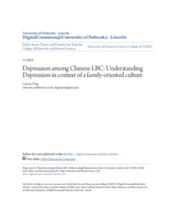Displaying 121 - 130 of 194
This study sought to assess the combined effects of physical neglect, a major embodiment of the left-behind phenomenon, and the trauma of being left behind on subsequent behavioral problems of children in rural China.
This paper examines the relationship between the migration of men from rural China and the educational attainment of their left‐behind children.
The authors of this study decided to perform two investigations to determine if university students with left-behind experience (USWL) might possess unique positive psychological capital factors.
Grounded in the framework of positive youth development (PYD), this study was designed to examine how ecological assets (i.e., neighborhood social cohesion and trusting relationships with caregivers) and individual strength (i.e., resilience) predict subjective well‐being among left‐behind children.
UNICEF is seeking a professionally qualified and experienced child protection officer with social work and research skills and ideally experience or familiarity in massive open online courses development.
This research examined the relationships among family structure (leftbehind status), caregiving, and child depression using archival data from the China Family Panel Studies (CFPS) in both cross-sectional and longitudinal analyses.
Based on empirical studies of 5836 children in six provinces of China's Mid-Western regions, this paper contributes to existing knowledge by analyzing the severity, consequences and risk factors of child abuse.
This study aimed to assess the specific influence of migrant mothers on early child development, especially on social–emotional problems.
This study examined the effects of grandparent–grandchild cohesion on the cross-lagged associations between depression and cultural beliefs about adversity in a sample of 625 rural left-behind children in China.
In this opinion piece, the Washington Post Editorial Board sheds light on the separation of children from their families in the Xinjiang province of China.

